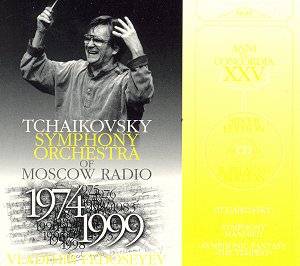The origins of Tchaikovsky’s ‘Manfred’ Symphony
stretch back to Berlioz and his dramatic symphonies and these
links help to explain how this singular work came about. In 1867
Berlioz made a last visit to Russia conducting amongst other works
the ‘Symphonie Fantastique’ and ‘Harold in Italy’. This caused
quite a stir amongst Russian composers and there was much talk
of programme symphonies. The critic Stasov sketched out a proposal
for a Manfred symphony. This proposal was appropriated by Balakirev
who, instead of writing a symphony himself, tried to interest
the ailing Berlioz in it. Failing this, the proposal languished
until 1882 when Balakirev brought it to the attention of Tchaikovsky.
Initially the proposal left him cold but eventually Tchaikovsky
duly read Byron’s original poem and sketched out a symphony during
1885. Tchaikovsky kept Balakirev’s dramatic outline, swapping
the middle two movements around, but ignored all of his suggestions
with regard to keys. The symphony was initially well received,
but the composer later came to feel that only the first movement
was a success.
This recording is part of a series celebrating
Vladimir Fedoseyev’s 25 years conducting the Tchaikovsky Symphony
Orchestra of Moscow Radio and the recording was made live in 1999.
Despite a Russian sounding bassoon in the opening pages, the score
fails to take wing until the first main string entry. The performance
becomes suitably dramatic but the string tone itself lacks the
sweep and warmth of other recordings. The recording quality is
adequate, but it is impossible to tell whether the rather steely
sound of the strings is a feature of the recording itself. The
playing is technically pretty good and there are some nice solos
from the wind and brass. Though the brass tend to rather dominate
in the climaxes. The wind players can have a rather tangy timbre;
it is nice to hear that even in the 1990s small differences in
national playing styles can survive. There are moments, though,
when the coordination between the strings and wind is a little
imperfect.
Fedoseyev seems to revel in the textures of the
moment, creating beautiful episodes rather than one dramatic sweep.
Manfred is a symphony that requires help if it is not to seem
like scenes from the ballet that Tchaikovsky did not compose.
Fedoseyev rather seems to enjoy this episodic structure. It does
not help that his speeds are on the steady side. For all the delicacy
of playing, the opening of the scherzo has a fatally steady pedestrian
quality. Comparison of speeds is helpful here. In the opening
movement Muti takes nearly 3 minutes longer than Fedoseyev, but
in the Scherzo, Fedoseyev takes a minute and a half longer. In
the Andante it is again Muti who takes his time. It seems that
in each movement, Fedoseyev errs on the side of caution and I
think it shows in the performance. This is a shame, because in
many ways Fedoseyev is a fine advocate for this symphony and there
are some superb moments along the way. But Muti’s version also
has running through it a vein of toughness which is to some extent
lacking in Fedoseyev’s performance. And it is this toughness which
helps to keep the spectre of the corps de ballet away from Muti’s
performance.
The companion work is Tchaikovsky’s earlier Tempest
Fantasy, of which Fedoseyev and the orchestra give an assured
performance; though even here the temperature fatally cools in
the quieter sections.
This is a fascinating recording of a fine Russian
orchestra, but for those interested in Tchaikovsky’s ‘Manfred’
Symphony this is not an ideal performance. Unfortunately, it is
difficult to recommend the Muti recording either as it seems to
be deleted at the moment.
Robert Hugill
